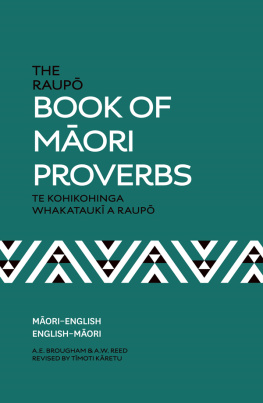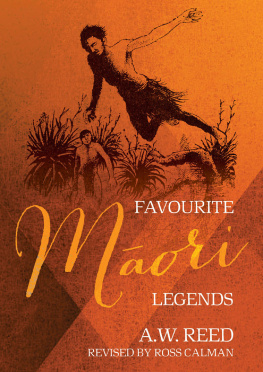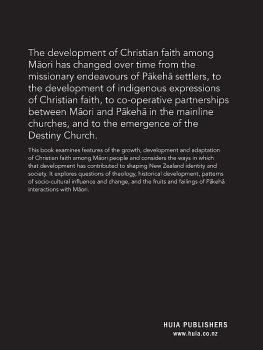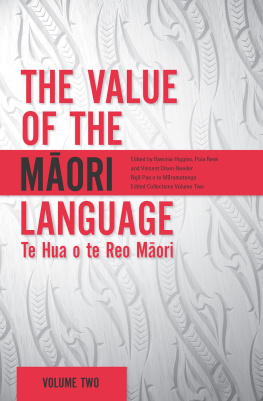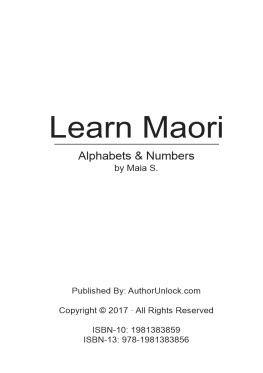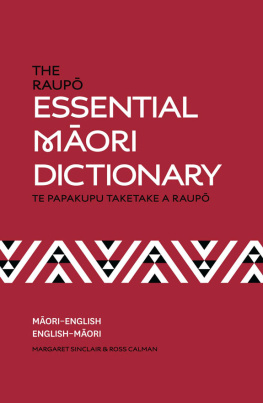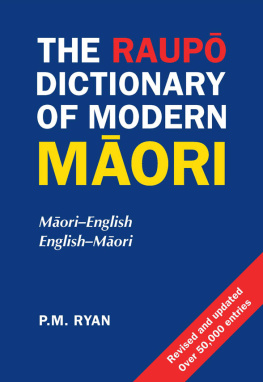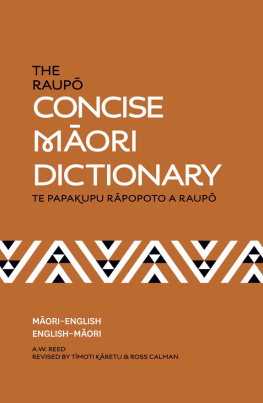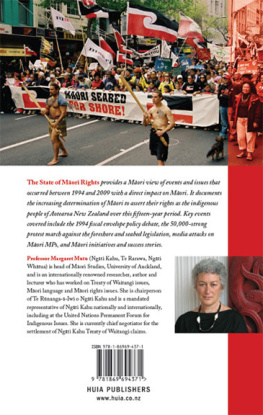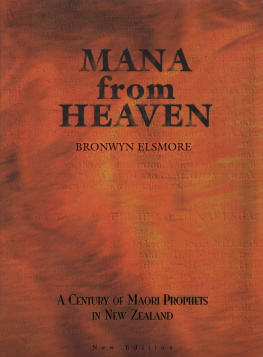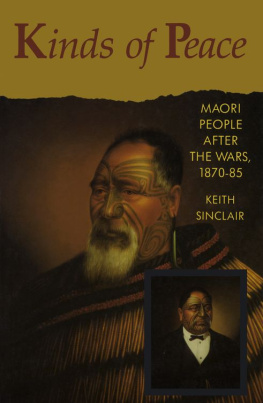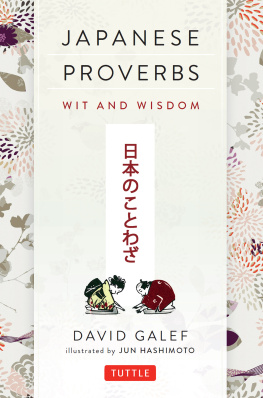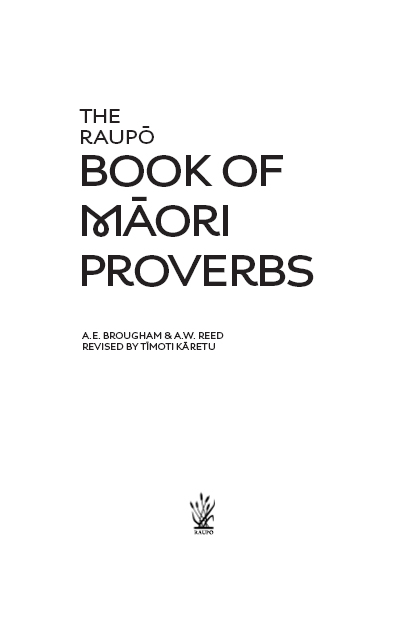Proverbs (or whakatauk) express the wisdom, wit and common sense of the Mori people. They are of great value and inspiration to writers, story-tellers and anyone speaking in a Mori setting.
PENGUIN BOOKS
UK | USA | Canada | Ireland | Australia
India | New Zealand | South Africa | China
Penguin Books is an imprint of the Penguin Random House group of companies, whose addresses can be found at global.penguinrandomhouse.com.
First published by Reed Publishing (NZ) Ltd, 1963
Revised editions published in 1987, 1996, 1999
This fifth edition published by Penguin Group (NZ), 2012
Copyright A.E. Brougham, A.W. Reed, T.S. Kretu, 1963, 1987, 1996, 1999
The right of A.E Brougham, A.W. Reed and Tmoti Kretu to be identified as the authors of this work in terms of section 96 of the Copyright Act 1994 is hereby asserted.
All rights reserved. Without limiting the rights under copyright reserved above, no part of this publication may be reproduced, stored in or introduced into a retrieval system, or transmitted, in any form or by any means (electronic, mechanical, photocopying, recording or otherwise), without the prior written permission of both the copyright owner and the above publisher of this book.
ISBN: 978-1-74-253263-9
Introduction
There is always reluctance, a tentativeness and a diffidence on ones part when approached to revise someone elses work. However, when one considers that this book was first published in 1963, it would seem timely that some kind of revision and extension be undertaken.
Firstly, there needed to be some consistency in the orthography and the punctuation. For instance, tribal names should be Ngti Porou rather than Ngti-porou on one occasion and then Ngti-Porou on another, and surely both Mori and Pkeh, when speaking of the people, are deserving of capitals at all times?
Some way of showing vowel length had to be introduced, hence the use of the macron. There are many archaic words used in whakatauk so a way of showing how they are pronounced had to be included.
An index to the proverbs by first line and category is essential, I feel, as it avoids any frustration on the part of the person using the book.
Categorising of the proverbs also had to be reconsidered.
As the introduction to the earlier edition stated, The diversity of subject is considerable, and it is inevitable that there should be a certain amount of repetition, but the imaginative mind of the Mori provides infinite variety. Where the repetition has been found to be unnecessary, the proverb is included once only.
Some proverbs were omitted because of their obscurity. There is little point in including a proverb quoting some ancestors name if tribe and locality are not known or under what circumstances the quote was made.
A wealth of proverbs is available and worthy of inclusion in a collection such as this. Those newly included have been because of their interest, their beauty of language and their wisdom, much of which might seem homespun to contemporary generations, but the philosophies expounded are no less relevant, even if the language seems quaint.
To be considered a good orator, one must be able to employ whakatauk where appropriate, for they encapsulate a thought so well that there is little need to use more words when these few are so apt and succinct. For the orators point to be appreciated, it is essential for the audience also to know whakatauk, and it is hoped that this volume might be an aid to both the orator and the audience.
Principal books consulted:
Sir George Grey, Ko nga Whakapepeha me nga
Whakaahuareka a nga Tupuna
The principal published source of Mori proverbs.
Reverend Richard Taylor, Te Ika a Maui
Taylors collection was made independently of Grey and although both works have many proverbs in common, a number of further examples are included.
Transactions of the New Zealand Institute
Especially Volume 12, which includes a comprehensive selection by William Colenso. The majority of the entries duplicate Greys collection, but new light is thrown on a number of them. Volume 22 also contains an article on proverbs and a number of examples by Judge F.H. Smith.
Reverend Reweti T. Khere, He Konae Aronui
This small book contains previously unrecorded examples, and a commentary on others. The collection is mainly East Coast in origin.
J.H. Mitchell, Takitimu
The book contains a further selection, again mainly from East Coast sources.
Te Ao Hou
Several issues of the magazine published by the Department of Mori Affairs contain collections by H.T.M. Wikiriwhi and Reverend Kngi-haka. Although only a small amount of new material is found here, there are some illuminating comments.
Bishop H.W. Williams, A Dictionary of the Maori Language
Many examples of proverbs are quoted in Mori throughout the dictionary, which has been consulted freely in order to provide fresh translations of the proverbs.
These are the principal sources, but acknowledgement is also made to the following writers among many others: Elsdon Best in The Maori, Tuhoe and other works; James Cowan; John Grace in Tuwharetoa; Leslie Kelly in Tainui; S. Percy Smith in The Wars of the Northern Maori Against the Southern Tribes of New Zealand During the Nineteenth Century; J.H. Menzies in Maori Patterns Painted and Carved; and to the volumes of the Journal of the Polynesian Society.
Tmoti Kretu
Ability
He ringa miti tai heke.
A hand which licks up the ebb tide.
The people of Wanganui were experienced in handling their canoes in the strong tidal waters of the river, in contrast to those who were familiar only with the more placid streams. The paddles wielded by the crews licked up the outflowing tide.
Abundance
E rua tau ruru,
E rua tau wehe,
E rua tau mutu,
E rua tau kai.
Two years of wind and storm,
Two years when food is scarce,
Two years when crops fail,
Two years of abundant food.
After long waiting, prosperity comes at last.
Hare Hongi translated the saying:
Two years of insect plague,
Two years of bad weather for crops,
Two years of penitence,
Two years of abundance.
Hinana ki uta, Hinana ki tai.
Hinana to the interior, Hinana to the sea.
Hinana was the name of the ptaka or food store of the Taup chief Te Heuheu, and was almost a synonym for plenty. It was packed with provisions such as birds from the inland forests and fish and whitebait (

